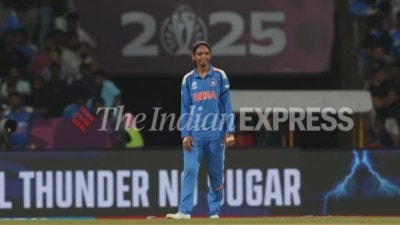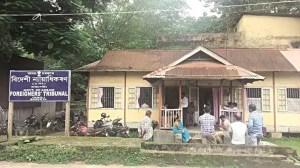In Sanatan season, RSS chief flags ‘2000 yrs’ of caste: ‘we didn’t bother when they lived like animals’
'Must be prepared to suffer for 200 years... RSS swayamsevaks ready to eat even food tinged with cow meat for the sake of assimiliation,' says RSS chief Mohan Bhagwat
 Rashtriya Swayamsevak Sangh (RSS) chief Mohan Bhagwat (Express Photo)
Rashtriya Swayamsevak Sangh (RSS) chief Mohan Bhagwat (Express Photo) IN one of his most unequivocal endorsements for reservation, RSS chief Mohan Bhagwat has said that caste discrimination has a history of 2000 years during which “we didn’t bother,” even when “unka jeena pashu samaan ho gaya” (the lives of those from backward castes became like that of animals). As retributive justice, he said, people must be prepared to suffer for even 200 years for the benefit of those who have suffered for so long.
Addressing a gathering of students at the Agrasen Chhatravas (hostel) in Nagpur, Maharashtra, Bhagwat also suggested that RSS workers would have no qualms eating even cow meat if that ensured assimilation of the deprived classes into the larger Hindu fold.
Bhagwat’s statement assumes significance coming against the backdrop of a controversy over DMK leader Udhayanidhi Stalin’s remarks against Sanatan Dharma. Udhayanidhi has argued that his call for “eradication” in respect of Sanatan Dharma was not an attack on Hindu religion but against what he flagged as its discriminatory and casteist structure.
While the RSS advocates caste-less society for its goal of a unifying Hindu fold, and Bhagwat has been careful not to raise any questions regarding reservation since a 2015 setback, the articulation of caste as a problem afflicting society for “2,000 years,” or possibly requiring corrective measures for 200 years, is new.
“Apne yahan jo aarakshan diya gaya hai… apne desh mein samajik vishamta ka itihaas raha hai. Aur humne apne hi samaj ke bandhuon ko samajik vyavastha ke tahat peechhe rakha. Unka jeena pashu samaan ho gaya to humne chinta nahin ki. Aur aisa kam se kam do hazaar varsh chala hi hai… Isiliye, jab tak woh bhedbhav hai, tab tak usko chaalu rehna chahiye. Samvidhan Samvat jitna aarakshan hai usko hum Sangh ke log poora samarthan dete hain (There has been a history of social inequality in our society. We kept our own people backward based on a social system. Even when their life became akin to animals, we didn’t bother. And this continued for at least 2,000 years. So as long as this discrimination exists, reservation must continue. The Sangh fully supports the constitutionally mandated reservation),” Bhagwat said, during a question-answer session, when a student asked how long reservations would continue.
The statement stands in contrast to Bhagwat’s statement in 2015, suggesting a review of the quota system. While the RSS had moved quickly to clarify, it is believed to have cost the BJP dear in the Bihar Assembly elections on at the time.
On Wednesday, Bhagwat said that giving reservation was more a question of respect than political or economic power. He also said that this was not to be underlined through argument but with sensitivity.
“Aaj dikhta nahin hai, lekin woh bhedbhav aaj bhi hai. Samman ki baat hai. Kewal aarthik baraabari ki baat nahin hai, kewal rajneetik baraabari ki baat nahin hai. Samajik baraabari, samman ki baat hai. App isey tark se samjhoge to kabhi nahin samajh sakte. Ye mann ki baat hai, apnepan ki baat hai. Is samasya ka ilaaj kewal paraspar samvedna aur sadbhav hai. To agar sadbhav banaa kar in baton ko dekhen, nafa-nuksaan ka vichar na karein, apne logon ke liye, jinhone 2,000 saal kasht jhela, hum 200 saal kasht jhel lein to kya farak padta hai (You may not see it, but the discrimination exists. This is not a question of political and economic equality. Social equality is a matter of respect. You cannot understand this solely as a means of making an argument. This is a question of kinship, empathy. The only solution is mutual sensitivity and goodwill. For our own people, who have suffered for 2000 years, if we have to suffer for 200 years, we must not complain.)
Incidentally, Maharashtra, the BJP coalition government is battling spreading protests over Maratha quota, and has moved a resolution to achieve it, subject to conditions.
Bhagwat went on to narrate an anecdote of RSS swayamsevaks having no qualms eating cow meat at an inter-caste community feast to not offend the deprived classes.
Once a group of vegetarian swayamsevaks had agreed to a sahbhojan (an inter-caste feast), he said. But when they went, they found they had been served meat. Bhagwat said they started eating so as not to offend their hosts. To top it, a host said their food had been spiked with cow meat and now they would “rot in hell for 42 generations”.
“So, an elderly among those eating said, ‘You see, for centuries, we have stayed apart. But now to assimilate you if it requires for us to rot in hell for 42 generations, we accept it’. It was later revealed it was not cow meat and the hosts were only testing the guests,” Bhagwat said, adding that “in kinship, you have to accept the ways of others”.
Bhagwat regretted that even now people were flogged for riding a palanquin and not allowed entry into temples, while officials had told him that, contrary to popular belief, caste discrimination existed even in higher services.
Bhagwat also drew a parallel between having reservation and making an exception in case of a sick family member who needed milk. “We don’t protest as to why the sick member is getting the milk,” he said.
While the RSS has long held agitations against caste discrimination and untouchability, its stand on reservation has not been as consistent.
In 1981, in the light of an anti-reservation movement in Gujarat, Prime Minister Indira Gandhi had said that merit should not be ignored while ensuring justice for deprived sections. Soon after, the RSS had passed a resolution at its Akhil Bhartiya Pratinidhi Sabha (ABPS), calling for “the constitution of a committee of non-partisan social thinkers, which will study in depth all the problems arising out of reservations and suggest positive steps for the uplift of (Dalits) and Tribals”.
The resolution also wanted the committee of thinkers to “recommend necessary concessions to the other economically backward sections with a view to ensuring their speedy development”, and “agree(d) with the Prime Minister’s viewpoint that reservation cannot be a permanent arrangement, that these crutches will have to be done away with as soon as possible”.
The same year, at the BJP National Council meeting held in Cochin in April, senior party leader Atal Bihari Vajpayee said: “Merely saying that while Dalits must get justice, merit must not be ignored, will not work… This national issue must be sorted out with a long-term vision.”
Four years later, in 1985, the RSS’s Akhil Bharatiya Karyakari Mandal (ABKM) “reiterate(d) its earlier demand that the Central government should, without further delay, come forward to constitute a representative committee of eminent and impartial persons to examine and evaluate in all its aspects and formulate a national consensus on the reservation policy”.
The same year, the ABKM “alerted” the government and the people against the “… exploitation of poverty and illiteracy of the backward classes and setting them up against the rest of society with the help of foreign funds… (as) a weapon of vote politics…”.
Another resolution adopted at the same ABKM said that the “… policy of reservation, designed and accepted as a means to accelerate the pace of development of our backward and neglected brethren and thus strengthen social harmony, (was) being stretched to ludicrous lengths, having been made a tool for partisan gains…”.
However, post the Mandal agitation and the rise of social justice parties, the Sangh-BJP needle on reservations began gradually shifting.
At a party meeting in Nagpur on August 27, 2000, then BJP president Bangaru Laxman, a Dalit, said: “… We should continue the present provisions of reservation in education, employment and legislature till it is necessary and we should ensure their implementation at all levels… A lot is yet to be done on the implementation of legal provisions dealing with caste-based discrimination… guilty are hardly punished… those who oppress Dalits, tribals and deprived castes are hardly brought to justice… it is time to completely review the implementation of laws to deal with social injustice and atrocities.”
Then came a watershed moment in the Sangh’s relationship with caste in 2015 when, in an interview to RSS-affiliated magazine The Organiser, Bhagwat said: “… Form a committee of people genuinely concerned about the interest of the whole nation and committed to social equality… they should decide which categories require reservation, and for how long. Like autonomous commissions, this non-political committee should be the implementation authority; political authorities should supervise them for honesty and integrity.”
The RSS clarified that Bhagwat actually said this in context of the need for ensuring that reservation benefits reached every deprived section of society. However, coming just ahead of the Bihar Assembly elections, the statement put the BJP in a spot as the Opposition accused it of planning to remove reservation.With the JD(U)-RJD fighting together at the time, the BJP suffered a severe drubbing in the state polls.
- 01
- 02
- 03
- 04
- 05































